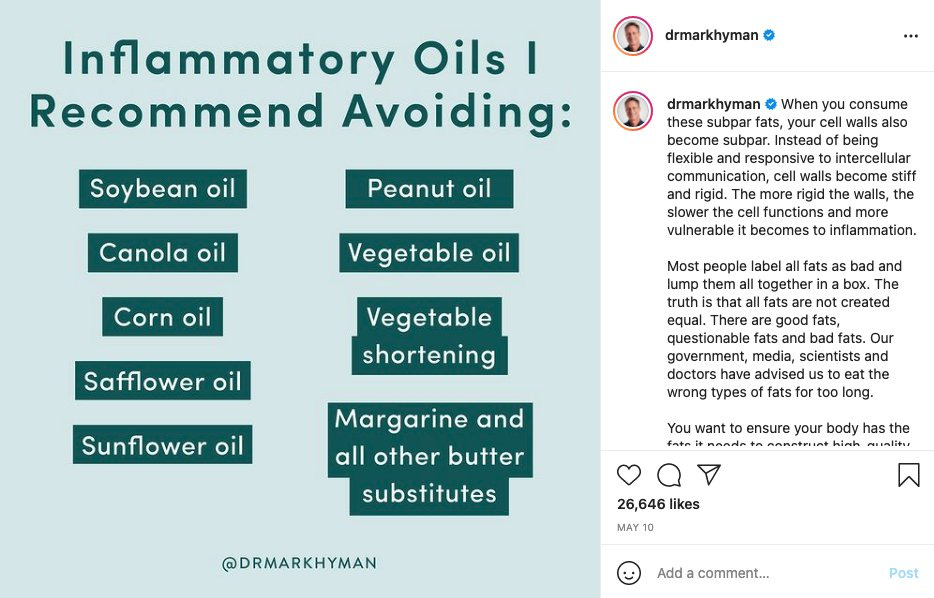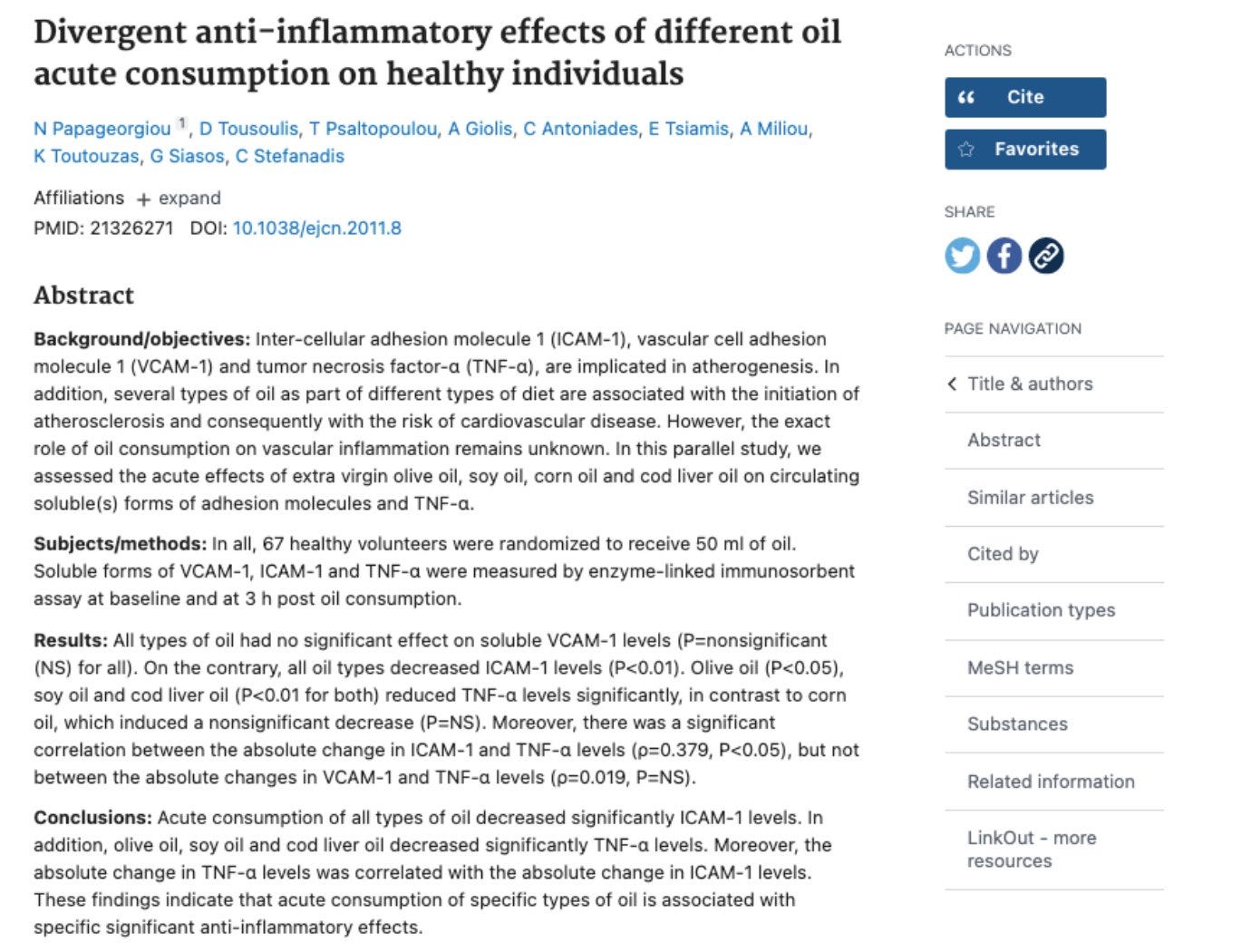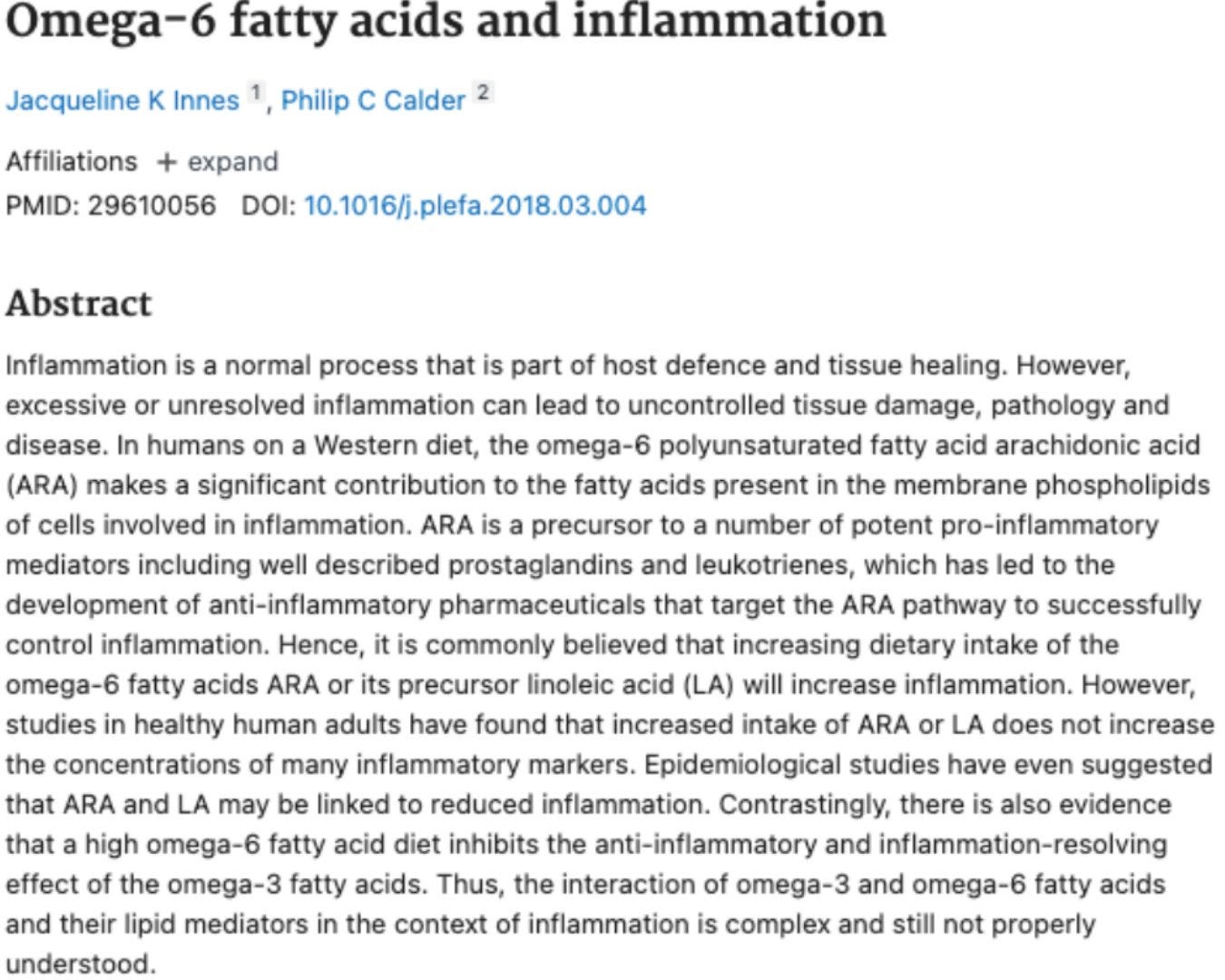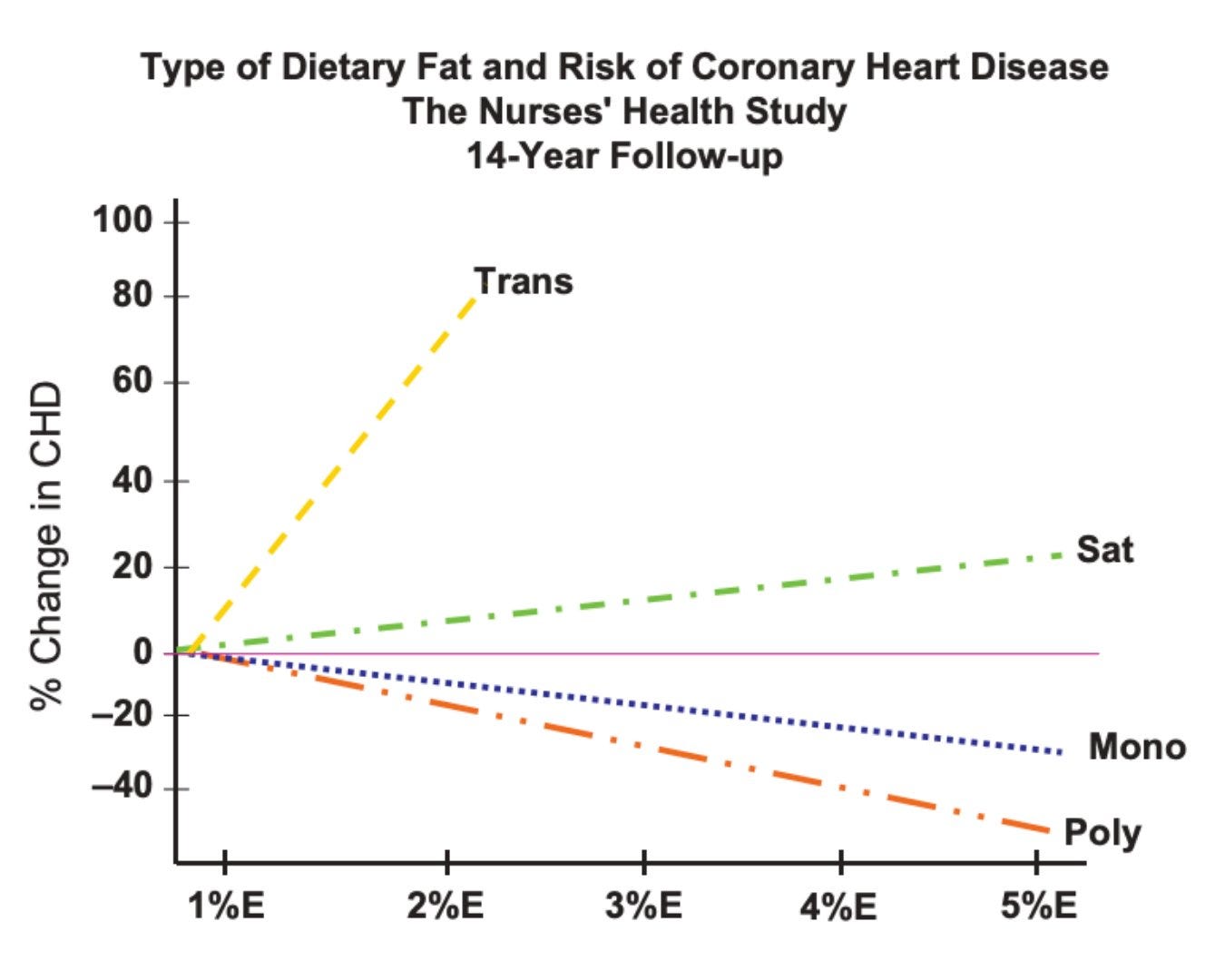Seed oils do not cause inflammation: in most people, they reduce it
A look at the clinical evidence
First of all, I write to thank those of you who are paid subscribers for your continued support. I haven’t been able to post this month because of demands in the real world, and I thank those who haven’t given up on me. As I have said, I will be completely back by the second week of June. These are desperate times, and I need all the support I can get.
Most who follow me now don’t know that I once debunked nutrition and other health misinformation. Among my friends I counted (and still do) some of the world’s renowned nutrition scientists and journalists, with whom I have even co-authored one or two papers. I was even once invited onto the Joe Rogan Experience to debate Gary Taubes: Stephan Guyenet went in my place.
About that I will say: always take whatever opportunity is offered to you, even if you do not feel ready. I still do not regret writing my Newsweek op-ed about COVID-19 or going on Tucker, even though it seriously derailed my life. I do regret however not going on Joe Rogan. That might have been fun.
As I return from my break, and as I continue work on preparing for the debate with Destiny, I would therefore like to take the time to start posting a bunch of my old health and nutrition articles. These articles will make it clear why, when I turned on COVID-19, the establishment turned to destroy me with more public vitriol than happened with most. It was because I was one of them, and one of their best communicators. They all followed me, retweeted me, shared me, talked about me with their friends—all until they viciously turned on me, called me a grifter, and began a relentless campaign to have me kicked out of medical school.
Publishing on health and nutrition again—and not always focusing on COVID—might also help me get rid of the uncanny sense that I am one of the characters in the Gulag Archipelago. Even as I cannot give up on Covid—I believe that we Covid dissidents are ethically obligated, for the future of public health, to attempt to define the historical narrative—these posts, which distract me from that task, are therapeutic.
My articles on health and nutrition are challenging and provocative. I have always been a gadfly and focused on the biggest targets I could find. I’m not interested in any schools of thought: I am interested in the most likely and interesting interpretations of the evidence. And it wasn’t hard to rip through narratives, either, because, given the level of detail at which I investigate matters, and given the laziness and/or complacency of most content creators (and even many scientists—more on that someday), it has always been easy to find gaping holes in most “scientific” stories.
But I have always also sought truth. So if you disagree and know of high-quality papers that contradict what I have written, I want to hear it.
Still, as a preliminary, I will say this:
Restricting seed oils in the diet often causes the restriction of many other things that cause poor health, especially but not limited to calories;
I am open to seed oils legitimately causing some health problems, which we have not well-characterized in the scientific literature.
In short, in the following post, I am only making a point that, at the population level, taking into account only seed oils and in groups of people, inflammatory markers indeed seem to decline when other sources of fat are replaced by so-called seed oils. This does not rule out countless other health effects of seed oils, good and bad. Nor does it mean that exceptional individuals, who might have bad reactions to the oils, do not exist. Nor does it mean that if you restrict seed oils, you might not see much improved health. In fact, this might be a fine approach to take to improve health—just not for the reasons many influencers have claimed.
But when seed oils are taken on their own… And that is all that is changing in the diet… And this is all I am saying… This is what happens according to the available evidence…
This post will constitute just one in a series of posts on seed oils…
And perhaps I will have one or two talking about how in some people with certain genetic variations, seed oils might actually cause inflammation…
Such (new) studies do exist…
Just not this article…
Without any further ado…
Are vegetable oils “toxic” or “inflammatory”? Evidence strongly shows the very opposite of this widespread myth.
Yet despite the constant drumbeat of science showing the healthfulness of “industrial seed oils”, an equally persistent drumbeat from the likes of Mark Hyman and others maligns them.
What is the truth?
Well, one paper published in the European Journal of Clinical Nutrition in fact showed that olive oil, soy oil, and cod liver oil all decreased some markers of inflammation.
And a recent article reviewing all currently available evidence concluded human trials consistently show that omega-6 fatty acids, a constituent in “seed oils” blamed for their supposed ill effects, do not cause inflammation.
And some of the highest quality observational evidence shows a dose-response relationship between degree of unsaturation of fatty acids consumed and reduction in heart disease risk.
Where do these myths about vegetable oils come from? Well, a few places:
1. The naturalistic fallacy- vegetable oils are “unnatural” and therefore they cannot be healthy, right? But this is a fallacy. Cooking is unnatural. Shoes are unnatural. Toothbrushes are unnatural. Now, certainly in some cases an appeal to nature makes sense. And maybe it does for vegetable oils. But that appeal is not sufficient in itself.
2. Mechanisms governing inflammation- omega-6 fatty acids might to “feed” inflammatory biochemical pathways. However, the clinical trial evidence does not bear these mechanisms out.
3. Other mechanisms such as endothelial dysfunction and oxidation. However, again, these mechanisms are contradicted by the available clinical trial evidence.
What the case of seed oils teaches us is that coming to conclusions based on mechanisms is inappropriate: we need to pay attention to the human evidence.
Now, vegetable oils may increase the calorie density of foods and make it easier to overconsume calories. However, compared to the alternative, such as butter, vegetable oils are much healthier.
My recommendation: use oils to the degree that you can keep overall calorie intake low, but definitely use them in place of traditional cooking fats like butter or lard. The science supporting this recommendation to prevent disease is among the strongest we have in nutrition.







One thing that seems wrong here is placing all seed oils into one bucket. It does seem like your conclusion is right based on a quick pubmed search. That said, I am not sure if it is the most useful metric. To me, ranking all the oils by all cause mortality is the real kicker (including no oils too).
Different olive oils have different polyphenol levels. Lots of adulterated and aged oils w/ OO and I imagine elsewhere . Also cooking vs raw, old vs new, storage temp, extraction type, reuse, etc. If olive oil (mono) is worse than canola (poly), which brands were tested and how do they fare based on their categorization above? Most Americans probably are buying cheap often adulterated OO so self reporting here would mess things up. I don't know how to take all this into account without using mechanism.
Keep away from seed oils. Way more ignored evidence out there.